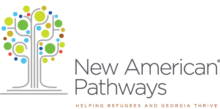This month’s thought leader piece is written by Anastassia Hardy, Family Empowerment program manager at New American Pathways. She reflects on women’s empowerment and is delighted to join women and men worldwide, celebrating women’s history month.
My name is Anastassia. I am a woman, a mother, an immigrant, and a professional agent of change. Women’s empowerment is what I do for a living. I feel incredibly privileged to be a part of a team that contributes to change on a global scale. The United Nations Sustainable Development Goal #5 is to “Achieve gender equality and empower all women and girls.” The U.N. Member States recognize this fundamental human right as a necessary foundation for a peaceful, prosperous, and sustainable world.
New American Pathways empowers refugee and immigrant women in many different ways. The Family Empowerment Department, which I manage, supports refugees on their parenting journey and through domestic violence prevention services. Although the concept of “family empowerment” varies in meaning in different parts of the world, I believe that its underlying concept is self-determination. Refugees are free to choose what their success in America looks like.
Parents as Teachers (PAT) is a nationally accredited, evidence-based curriculum delivered by certified educators through personal home visits. The concept is simple: to empower parents to become their children’s first and most influential teachers. Before the COVID-19 pandemic, PAT educators served roughly 80 refugee households annually with regular bi-weekly home visits. Personal home visits are the beating heart of the PAT model because activities are incredibly hands-on. In March 2020, nobody knew if it was even possible to facilitate parent-child interaction or spot some red flags in development remotely. By March 2021, PAT educators delivered close to 1,200 remote home visits to 86 families. The program kept an unprecedented 95 percent retention rate. “Televisiting” became as commonly used as telemedicine, although it took time for the families and educators to adjust.
The COVID-19 pandemic has led to a steep increase in violence against women and girls worldwide, including the United States. According to the recently released U.N. report, with lockdown measures in place, many women are trapped at home with their abusers, struggling to access services that suffer from cuts and restrictions.
New American Pathways assists over one hundred foreign-born victims and survivors of domestic violence. These clients are the most vulnerable; they are also among the ones whose lives are the most profoundly impacted by the services. Refugee survivors of domestic violence often face significant obstacles that effectively tie them to their batterers: limited English proficiency, cultural norms that discourage reporting (or justify violence against women), a lack of understanding of their legal rights and immigration status, economic dependence, and social isolation.
I remember a woman who once sat in my office, frightened and distraught. Her abuser convinced her that if she “did not act right”, he would start a deportation process with one click of a computer mouse. A year later, the same woman finalized her divorce, was gainfully employed, had her own place, and was enrolled in ESL classes.
Since March 2020, our family violence program received an unusually high volume of hotline calls. The number of reports from the Clarkston Police Department also increased. The remote coordination of services required a tremendous effort. The program continued providing all the core services that it typically offers and more! For instance, not a single survivor faced eviction due to loss of employment. Victim advocates secured over $20,000 in emergency rental assistance from community partners to keep clients in homes during the pandemic. Because lockdown coincided with the tax return season, advocates also connected clients with free tax preparation services.
Women’s empowerment has a unique ripple effect. All women can empower each other like nobody else. Years ago, I placed a young student from Africa in a shelter. She fled her abuser with one suitcase, two small kids, and a firm determination to succeed in the U.S. For her, the success meant to re-enroll in college (the opportunity she was deprived of by the abuser). She was preparing for her Graduate Record Exam (the GRE test) at night when everyone in the shelter was asleep. Today her LinkedIn profile has a picture of a beautiful, vibrant woman in an impeccably tailored suit. This woman has two degrees from the U.S. (MPH and MBA), a fantastic place of employment (World Health Organization), and successful life on her terms.
My job description does not list the following responsibility: “Supports the achievement of gender equality and empowers all women and girls.” However, this little bullet point, which also happens to be the U.N. Sustainable Development Goal #5, guides my work. I want to congratulate all women for empowering women to make our world a better place. Thank you!

